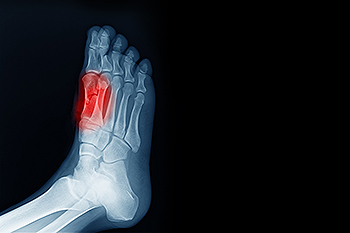Garner (919) 661-4150
Facts About Sesamoiditis
Tuesday, 22 October 2024 00:00
Sesamoiditis is an inflammation of the sesamoid bones, which are small bones embedded within the tendons of the big toe. This condition typically arises due to repetitive stress or overuse, often experienced by athletes or individuals who engage in activities that involve pushing off the toes, such as running or ballet. Common symptoms include pain in the ball of the foot, swelling, and tenderness, particularly during movement or when pressure is applied. Affected individuals may also experience difficulty bearing weight or limited range of motion in the big toe. Factors contributing to sesamoiditis include wearing improper footwear, high-impact sports, and foot deformities like high arches or flat feet. Sesamoiditis can cause pain and discomfort, and it may become difficult to complete daily activities. If you have developed this condition, it is suggested that you are under the care of a podiatrist who can offer you appropriate treatment solutions.
Sesamoiditis is an unpleasant foot condition characterized by pain in the balls of the feet. If you think you’re struggling with sesamoiditis, contact Chukwuma Ukata, DPM of Advanced Carolina Foot and Ankle Center. Our doctor will treat your condition thoroughly and effectively.
Sesamoiditis
Sesamoiditis is a condition of the foot that affects the ball of the foot. It is more common in younger people than it is in older people. It can also occur with people who have begun a new exercise program, since their bodies are adjusting to the new physical regimen. Pain may also be caused by the inflammation of tendons surrounding the bones. It is important to seek treatment in its early stages because if you ignore the pain, this condition can lead to more serious problems such as severe irritation and bone fractures.
Causes of Sesamoiditis
- Sudden increase in activity
- Increase in physically strenuous movement without a proper warm up or build up
- Foot structure: those who have smaller, bonier feet or those with a high arch may be more susceptible
Treatment for sesamoiditis is non-invasive and simple. Doctors may recommend a strict rest period where the patient forgoes most physical activity. This will help give the patient time to heal their feet through limited activity. For serious cases, it is best to speak with your doctor to determine a treatment option that will help your specific needs.
If you have any questions please feel free to contact our office located in Garner, NC . We offer the newest diagnostic and treatment technologies for all your foot and ankle needs.






